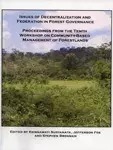Error message
Issues of Decentralization and Federation in Forest Governance: Proceedings from the Tenth Workshop on Community-Based Management of Forestlands
Issues of Decentralization and Federation in Forest Governance: Proceedings from the Tenth Workshop on Community-Based Management of Forestlands





